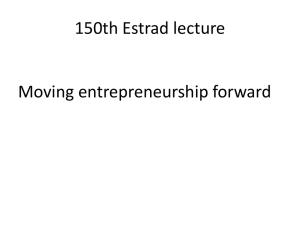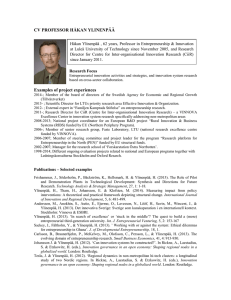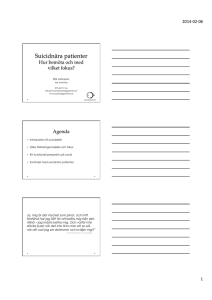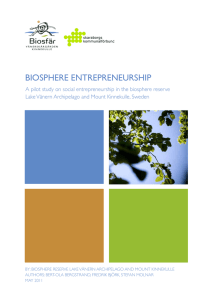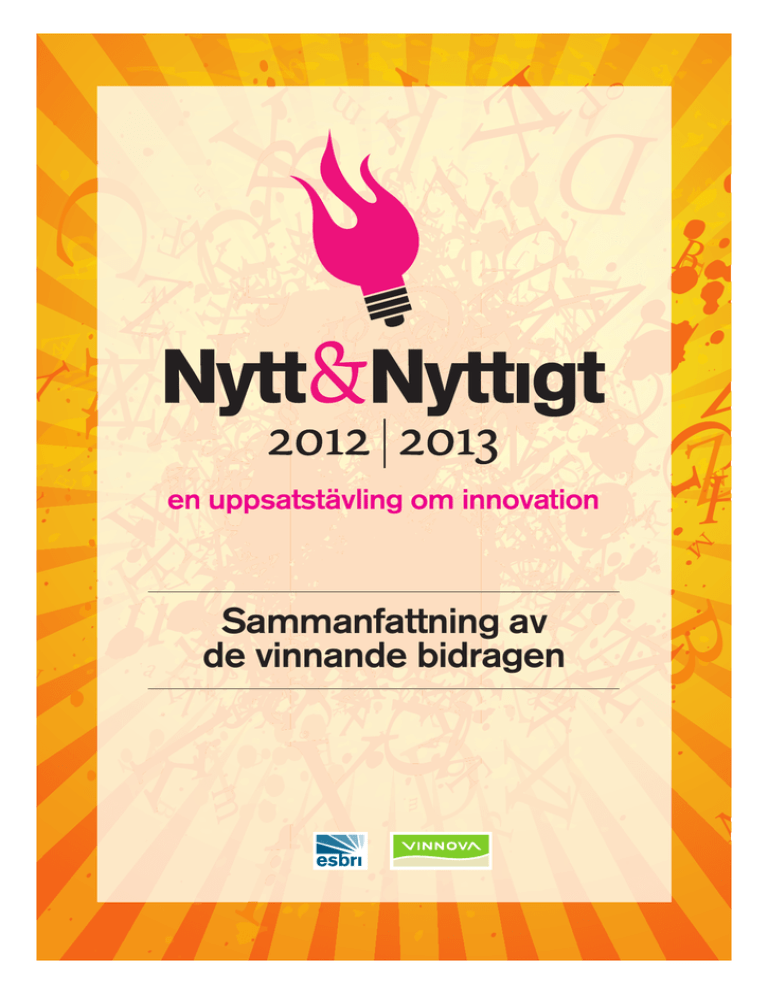
en uppsatstävling om innovation
Sammanfattning av
de vinnande bidragen
INNEHÅLL
Förord
2
Juryns beslut
3
Hedersomnämnanden
4
Juryns motiveringar
5
How Can Idea Campaigns Generate Ideas to Trigger Innovation?
7
Innovating out of the Fishmeal Trap
9
Firm-level entrepreneurship in the Second Great Depression
11
FÖRORD
Uppsatstävlingen Nytt&Nyttigt arrangeras av ESBRI (Institutet för entreprenörskapsoch småföretagsforskning) och VINNOVA. Förmågan att tänka nytt, och att omvandla
idéerna till något nyttigt för samhället, är central för en hållbar tillväxt. Många menar
att innovationer kan bidra till att lösa globala samhällsutmaningar som
klimatförändringar, åldrande befolkning, pandemier och terrorism. I takt med att
förväntningarna på innovationer ökar, växer också samhällets och företagens behov
av att förstå vad innovation är.
Syftet med Nytt&Nyttigt är att uppmuntra studenter vid svenska universitet och
högskolor att skriva uppsatser om innovation, kommersialisering och nyttiggörande. I
denna skrift presenteras en sammanfattning av de vinnande bidragen för läsåret
2012/2013. Respektive uppsatsförfattare svarar själv för sammanfattningen.
Juryn har bestått av följande personer:
Kristina Ahlsér, landshövding Kronoberg län
Martin Andersson, professor Lunds universitet
Magnus Aronsson, vd ESBRI
Charlotte Brogren, generaldirektör VINNOVA
Sofia Börjesson, professor Chalmers
Göran Marklund, direktör VINNOVA
Maureen McKelvey, professor Göteborgs universitet
Björn O Nilsson, vd IVA
Dominic Power, professor Uppsala universitet
Sverker Sörlin, professor KTH
Elisabeth Thand Ringqvist, vd Företagarna
Juryn har i sin bedömning utgått från följande kriterier:
• originalitet och nytänkande
• problematisering – formulering av problemet och dess relevans
• metod – förhållandet problem-teori-empiri-analys
• analysförmåga – struktur och koppling mellan data/resultat/förslag
• praktisk relevans/angeläget ämne
• språkbruk och framställningsförmåga i övrigt
Tävlingsåret 2012/2013 deltog 76 uppsatser i Nytt&Nyttigt. Huvuddelen av landets
universitet och högskolor var representerade med deltagande studenter. Författarna
till de tre bästa uppsatserna erhåller resestipendier à 30 000, 20 000 respektive
15 000 kronor. Resestipendierna kan användas för studieresor i syfte att utveckla
kompetensen inom problemområdet, alternativt till deltagande i seminarier eller
andra aktiviteter som bidrar till att höja kompetensen hos stipendiaterna.
Stockholm, november 2013
Helene Thorgrimsson
Projektledare ESBRI
helene.thorgrimsson@esbri.se
2
JURYNS BESLUT
1:a pris
How Can Idea Campaigns Generate Ideas to Trigger Innovation?
Författare: Kajsa Brange & Elin Lindqvist
Kontakt: kajsabrange@gmail.com, elin, lindqvist1@gmail.com
Handledare: Susanna Bill & Stein Kleppestø
Lärosäte: Lunds universitet, Designvetenskaper LTH och Företagsekonomi EHL
2:a pris
Innovating out of the Fishmeal Trap
Författare: Jonathan Moy de Vitry
Kontakt: jon.a.mdv@gmail.com
Handledare: Johan Brink
Lärosäte: Handelshögskolan vid Göteborgs universitet, Institutionen för innovation
och entreprenörskap
3:e pris
Firm-level entrepreneurship in the Second Great Depression
Författare: Marc Hoogendoorn
Kontakt: marchoogendoorn111@gmail.com
Handledare: Gert-Olof Boström
Lärosäte: Umeå Universitet, Umeå School of Business and Economics
3
Hedersomnämnanden
Juryn har valt att tilldela sex uppsatser ett hedersomnämnande:
Lånefinansiering av start-ups – ett konstruktivt förslag om
kreditriskbegränsning genom registrerade negativklausuler
Författare: Mikael Mellberg
Lärosäte: Handelshögskolan vid Göteborgs universitet, Juridiska institutionen
Ord, tid & pengar: En kvalitativ studie av hinder och motsättningar i
arbetsprocessen med forskningskommersialisering i högskolenära inkubatorer
Författare: Daniel Kvarnström & Amanda Mannervik
Lärosäte: Mälardalens högskola, IDT – akademin för innovation, design och teknik
Improving Internal Idea Generation – exploring the first phase of the innovation
process in Engineering Contractor Inc.
Författare: Ingvild Nyløkken & Karin Berg
Lärosäte: Handelshögskolan vid Göteborgs universitet
Innovating in 'the dream factory': Social change through mindset-change
Författare: Linda Staflund & Nathalie Thalberg Pedersen
Lärosäte: Internationella Handelshögskolan i Jönköping, Företagsekonomiska
institutionen
Med livet som utbildning: Team och enskilda entreprenörers uppfattningar av
lärande
Författare: Veronica Carlsson
Lärosäte: Blekinge Tekniska Högskola, Sektionen för management
Knowledge networks in organizations - network position and absorptive
capacities
Författare: Boris Becker & Florian Stern
Lärosäte: Internationella handelshögskolan i Jönköping
4
JURYNS MOTIVERINGAR
Juryn har motiverat sitt val av vinnande bidrag enligt följande:
1:a pris
How Can Idea Campaigns Generate Ideas to Trigger Innovation?
Kajsa Brange & Elin Lindqvist
Lunds universitet
Grunden till all innovation är idéer, eftersom de kan ses som bränsle till den innovativa
processen. Därför är det viktigt för företag och organisationer att ta tillvara alla
medarbetares kreativitet. Avsikten med denna uppsats är att öka förståelsen för hur stora
företag i allmänhet, och företaget Eon i synnerhet, kan genomföra kampanjer med avsikt
att stimulera idégenerering hos medarbetarna. Med ett sådant förfarande hoppas man
kunna upprätthålla en konkurrensfördel gentemot andra företag.
Författarna har inriktat sig på ett angeläget ämne, det vill säga intraprenörskap, och
resultatet kan direkt användas som underlag för beslutsfattare i stora företag och
organisationer.
Ämnesvalet är aktuellt och trots en komplicerad ansats har författarna lyckats lyfta fram
både en bra teoretisk genomgång och en tydlig och intressant diskussion. De har
identifierat ett antal nyckelfaktorer som är viktiga för att genomföra en kampanj med ett
lyckat resultat. Uppsatsen beskriver på ett logiskt och pedagogiskt sätt hur ramarna för
en idékampanj har utvecklats utifrån dessa faktorer.
2:a pris
Innovating out of the Fishmeal Trap
Jonathan Moy de Vitry
Göteborgs universitet
Den globala livsmedelsförsörjningen är en angelägen fråga. Global uppvärmning, en
kraftig befolkningsökning och brist på resurser är utmaningar som vi står inför. Därför är
det nödvändigt att dagens livsmedelssystem utvecklar effektivare och mer hållbara
produktionsmetoder. Denna uppsats beskriver hur man i Norges fiskodlingar brutit
etablerade strukturer och prövat en ny teknologi som både är miljövänlig och ekonomiskt
fördelaktig.
Uppsatsen hanterar ett aktuellt ämne i en ny näringssektor, och därmed frågor som
sannolikt kommer att bli ännu viktigare i framtiden. Författaren har på ett förtjänstfullt sätt
balanserat empiri och teori, samt beskriver denna innovations påverkan i ett större
perspektiv.
Avvägningen mellan selektiva och generella insatser diskuteras på ett mycket
intresseväckande och relevant sätt. Uppsatsen sätter även fokus på när, var och hur
policyåtgärder behövs i beslutsprocessen.
5
3:e pris
Firm-level Entrepreneurship in the Second Great Depression
Marc Hoogendoorn
Umeå universitet
Vi lever i dag i en globaliserad värld där vi återkommande ser ekonomiska kriser. Temat
för denna uppsats är hur företags entreprenöriella orientering kan ha en positiv inverkan
på deras överlevnad och tillväxt under en ekonomisk kris i omvärlden. Författaren
definierar Entreprenöriell Orientering (EO) som ett företags strategiska orientering mot
entreprenöriell aktivitet.
Uppsatsen fokuserar på en relevant och aktuell frågeställning, och via empirisk data
belyser författaren betydelsen av entreprenöriell orientering i perioder av ekonomisk
instabilitet.
Uppsatsen är genomgående välskriven. Den är också viktig ur ett näringspolitiskt
perspektiv och lyfter många intressanta frågor för fortsatt forskning. Med en ytterligare
underbyggd teoridel skulle denna uppsats mycket väl ha kunnat nå en ännu högre
placering.
6
Master Thesis in Technology Management, 30 ECTS Department of Design Sciences, Faculty of Engineering Department of Business Administration, School of Economics and Management How Can Idea Campaigns Generate Ideas to Trigger Innovation? -­‐ A Case Study at E.ON Authors: Kajsa Brange & Elin Lindqvist Supervisors: Stein Kleppestø & Susanna Bill 7
How Can Idea Campaigns Generate Ideas to Trigger Innovation?
Författare: Kajsa Brange & Elin Lindqvist
The starting point for innovation is ideas, which can be seen as fuel to the innovation
process. There is a vast literature on the success of a few radical ideation methods
and the use of creativity tools, while few have dealt with the use and effects of
ideation approaches in practice. The issue to study is internal ideation and how to
take advantage of employees’ ideas to trigger innovation. Tapping into the creativity
of employees and collecting their ideas is a general desire of companies. However,
managing ideation is a common challenge for large organisations. The authors of this
Master Thesis therefore seek to answer what are success factors for managing
ideation in large organisations and how can an idea campaign be conducted
successfully in the front end of innovation?
From literature on ideation in general and idea campaigns in particular, six key
factors for managing ideation were identified. These were then validated as important
in a pre-study including six large Swedish companies (Volvo Group Trucks
Technology, Volvo Cars, Tetra Pak, SCA, IKEA and Ericsson), as well as in a case
study conducted at E.ON in Sweden. The identified key factors are: communication,
collaboration, incentives, innovation climate, management support, and idea
management. All of the key factors are considered to be important for managing
ideation successfully in large organisations.
Based on the identified key factors, an Idea Campaign Framework for how to conduct
an idea campaign successfully was developed. The framework as a whole includes
three phases of ideation: ideation planning, ideation execution and ideation follow up.
The main focus has been on the execution phase, which was developed to help large
organisations to conduct an idea campaign successfully. The execution phase
illustrates how key factors should be addressed in order to trigger certain features,
which in turn would lead to desired effects of a successful idea campaign.
The Idea Campaign Framework has been empirically tested at E.ON in Malmö,
Sweden, through the launch of an idea competition called ‘Bright Ideas’. The idea
competition was launched during two weeks in the spring of 2013 and resulted in 160
ideas. The empirical evidence from the test at the case company conclude that the
elements in the Idea Campaign Framework are important to consider in attaining
employees’ ideas in large organisations. To conclude, the framework may be used as
a guide for how to conduct an idea campaign successfully in order to attain
employees’ ideas and feed the innovation funnel with ideas to trigger innovation.
8
Innovating Out of the Fishmeal Trap A case study on how niche conditions in the Norwegian aquafeed sector led to the development of a sustainable technology with global potential Jonathan Moy de Vitry Graduate School Master of Science in Innovation and Industrial Management Master Degree Project Supervisor: Johan Brink 9
Innovating Out of the Fishmeal Trap: A case study on how niche conditions in the
Norwegian aquafeed sector led to the development of a sustainable technology with
global potential
Författare: Jonathan Moy de Vitry
In the last 15 years, the Norwegian salmon aquaculture industry has used innovation
to overcome a systemic threat known as the “Fishmeal Trap,” an overreliance on
scarce and potentially unsustainable commodities derived from wild marine sources.
The study of cases like this one is important because, as trends in population growth,
resource scarcity, and global warming converge, it is no exaggeration to say that
global food security is an extremely pressing issue. Addressing this challenge will
require that agricultural systems transition towards more efficient and
environmentally sustainable production regimes through the generation and adoption
of new technologies. Therefore, a better understanding of successful transitions can
help pave the way for more effective policies on the issue.
This thesis focuses on the rapid development of Dynamic Formulation (DF)
technology, which enables the replacement of fishmeal in salmon feed by sustainable
ingredients, within a subsector of the Norwegian aquaculture cluster. Based on
qualitative empirical data gathered from 20 interviews with a variety of actors from
the industry, this case study delves into the sectoral dynamics that set the stage for
this success. Building on the concepts of innovation systems and socio-technical
niches borrowed from the multi-level framework, the author uses this data to describe
the particularities of the Norwegian sector and how these translated into innovation
system functionality, or the ability of a sector to foster innovation.
It was found that the Norwegian aquafeed subsector is distinguished from those in
the rest of the world by the following traits: a Single Application Market, KnowledgeDriven Competition, Consolidated Producers, Advanced Customers, Strong
Knowledge Infrastructure, and Strong Production & Downstream Regulation. Taken
together, these factors formed a niche innovation system where Dynamic
Formulation investments were economically viable, ultimately allowing Norway to
lead the world in the development of this technology despite the fact that it ranks as
only its 7th largest aquaculture producer. While governmental policies can be
credited with certain of these attributes, such as the Strong Knowledge Infrastructure,
the majority of them could be considered as emergent from sectoral structure.
Therefore, the author concludes that this case demonstrates an example of a
successful natural niche innovation system. That said, the author considers that the
performance of the Norwegian niche innovation system could be further optimized by
policies designed to encourage collaboration and information sharing among its
major industrial players. Given the potential of aquaculture in addressing food
insecurity and the magnitude of the technological bottlenecks yet to be overcome
regarding fish oil shortages, there is still room for improvement.
10
Firm-level entrepreneurship in
the Second Great Depression:
A quantitative study on the influence of EO on
performance in the economic crisis
Author:
Marc Hoogendoorn
Supervisor:
Gert-Olof Boström
Student
Umeå School of Business and Economics
Spring Semester 2013
Master thesis, 15 ECTS
11
Firm-level entrepreneurship in the Second Great Depression: A quantitative
study on the influence of EO on performance in the economic crisis
Författare: Marc Hoogendoorn
Anno 2013 Europe resides in a severe economic crisis that has been lasting for five
years. Companies are struggling to deal with the influences of this crisis and require
strategic insights to maintain performance. According to theory, entrepreneurship and
innovation are central mechanisms in the creation of wealth in the capitalist system
and an entrepreneurial strategy could provide relatively much benefit in a crisis
period.
A variety of theories on entrepreneurship, innovation and the creation of wealth in
capitalism were examined. On many occasions quantitative research has been
performed to measure the relationship between an Entrepreneurial Orientation and
performance. This study provides an extra dimension by using archival financial data
of companies during and before the crisis to draw comparisons and examine
developments in performance in relation to an Entrepreneurial Orientation. Data on
the Entrepreneurial Orientation was collected with an online survey which was sent to
companies. The results of the survey indicated the degree of Entrepreneurial
Orientation of the companies in separate categories; innovativeness, proactiveness
and risk taking. The results were linked to their financial performance which was
obtained from a database. Comparisons between the performance before and during
the crisis in relation to the scores on entrepreneurship were made, and the
development of their financial performance since the crisis was examined.
This study offers insight on the influence of entrepreneurship on the performance of
companies and how this is affected differently during the current economic crisis.
Furthermore the influence on the development of the performance of companies
throughout the crisis is clarified. The results of this study indicate that an
Entrepreneurial Orientation has a relatively more positive influence on performance
during the crisis. The results of this study follow a logical trend in comparison with
notable theories on the relationship between firm-level entrepreneurship and
performance which established that the relationship is stronger in more hostile and
dynamic environments. The increasingly hostile economic environment indeed
increases the Entrepreneurial Orientation – performance relationship. However the
relationship between an Entrepreneurial Orientation and performance is highly
dependent on the company and type of industry so no unilateral positive correlations
with performance were found. For a set of industrial, manufacturing, chemical and
service companies the development of the financial performance since the crisis is
highly positively correlated with innovativeness and proactiveness. For a set of other
company types including foundations, (public) utility companies, (public) real estate
companies, construction companies, trade and investment firms no correlations were
found.
The findings in this study indicate that depending on the type of company and
industry, an Entrepreneurial Orientation can have a strong positive effect on the
development of financial performance in the crisis. The test results support the
theories on innovation and entrepreneurship as increasingly important factors in the
crisis by measuring that indeed the influence on performance increases.
12
www.innovationsuppsats.se

